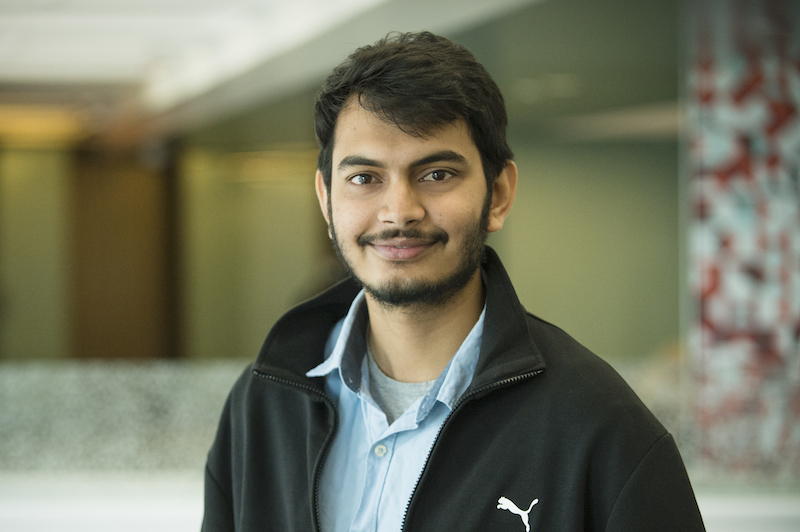Aditya Ponnada
PhD Student

Education
- BDes in Industrial Design, Indian Institute of Technology, Guwahati, India
About Aditya
- Hometown: Hyderabad, India
- Field of Study: Human-computer interaction, Personal Health Informatics, Mobile/Wearable computing
- PhD Advisor: Stephen Intille
Biography
Aditya Ponnada is a PhD student in the Personal Health Informatics program at Northeastern University’s Khoury College of Computer Sciences, advised by Professor Stephen Intille.
Aditya spent his undergraduate education at the Indian Institute of Technology in Guwahati, India, where he earned a Bachelor in Design (BDes) degree in Industrial Design. Before coming to Northeastern, Aditya spent two years as a User Experience Researcher at Samsung Electronics, where he worked on the company’s personal health application, S-Health and their text-input methods on galaxy devices.
At Northeastern, Aditya’s research includes the fields of personal health informatics, human-computer interactions, and mobile/wearable interaction design. In particular, he is designing ways of gathering high temporal density self-report data using mobile/wearable technologies to measure behaviors that sensors cannot measure independently.
What are the specifics of your graduate education (thus far)?
I am working on a new self-report behavior measurement technique that uses quick glanceable microinteractions on a smartwatch to gather self-report data (by just asking people about their experiences). This method could be used to measure behavior in real-world settings for health behavior and ubiquitous computing research. I am also working on designing a human-computation game that crowdsources annotation of large-scale raw sensor data collected in naturalistic settings.
What are your research interests?
My research interests are at the intersection of computer science, health behavior research, and interaction design. I am interested in designing novel mobile and wearable technologies to improve overall health and well-being.
What’s one problem you’d like to solve with your research/work?
How can we use consumer-grade mobile and wearable technologies to quantify our everyday lives?
What aspect of what you do is most interesting?
Stepping out of my comfort zone and finding unexpected results. Working on a project end-to-end (from design, development, evaluation, and outreach) on my own is what has driven my work so far.
What are your research or career goals, going forward?
I wish to be a part of a motivated research team comprising of engineers, designers, data scientists, behavioral researchers, and artists, irrespective of academia or industry. I personally do not see the difference in these two as long as they work towards impactful ideas.
Where did you grow up or spend your most defining years?
I spent the majority of my childhood in various cities in India ranging from very busy metro areas, to cold, country areas.
Where did you study for your undergraduate degree?
I did my undergraduate degree in industrial design (BDes) from Indian Institute of Technology, Guwahati. This program was a unique offering in India from a prestigious technological institute.
Recent Publications
-
Measuring Criterion Validity of Microinteraction Ecological Momentary Assessment
Citation: Ponnada A, Thapa-Chhetry B, Manjourides J, Intille S Measuring Criterion Validity of Microinteraction Ecological Momentary Assessment (Micro-EMA): Exploratory Pilot Study With Physical Activity Measurement JMIR Mhealth Uhealth 2021;9(3):e23391 -
Signaligner Pro: A Tool to Explore and Annotate Multi-day Raw Accelerometer Data
Citation: A. Ponnada et al., "Signaligner Pro: A Tool to Explore and Annotate Multi-day Raw Accelerometer Data," 2021 IEEE International Conference on Pervasive Computing and Communications Workshops and other Affiliated Events (PerCom Workshops), 2021, pp. 475-480, doi: 10.1109/PerComWorkshops51409.2021.9431110. -
MixWILD: A program for examining the effects of variance and slope of time-varying variables in intensive longitudinal data
Citation: Dzubur, E., Ponnada, A., Nordgren, R. et al. MixWILD: A program for examining the effects of variance and slope of time-varying variables in intensive longitudinal data. Behav Res 52, 1403–1427 (2020). https://doi.org/10.3758/s13428-019-01322-1